#great advice!!
Text
Every week, you should be cleaning out all expired and spoiled foods out the fridge, cleaning them shelves so they aren't sticky and stank. Then put a Lil container of baking soda in there to keep fresh. This is EVERY WEEK ❤️
10 notes
·
View notes
Text

the boys of class 1A love to go to kirishima for advice
#They love his thags theyr man crush or whatever#I’m not saying he gives great advice I’m just saying they value his opinion a lot#i can feel it#bnha#kirishima eijirou
3K notes
·
View notes
Text
My enjoyment of writing, my productivity, and the quality of my work improved tenfold when I started embracing slumps and taking them as an opportunity to read everything I could get my hands on, watch lots of films and shows, go to the theatre, play games, hang out with friends, visit new places, and generally absorb life and marinate my brain in the art of storytelling.
Take from that what you will.
#writing advice#writing#writeblr#writers on tumblr#writer problems#radley writes#creative writing#writer's block#writers#writer's block is to be cuddled and nurtured not loathed x#unless you are beholden to deadlines in which case - HATE HATE HATE#radley rambles#my experience will not be your experience etc. etc. etc.#if 'write every day' works for you great!!#if not... this post may be for you
4K notes
·
View notes
Text
If you struggle with learning to draw Transformers or other mecha characters: It's all about bullshitting. As long as it looks consistent in itself, it doesn't matter at all if it's not too accurate. It's about having fun, and if you need to cut some corners, go for it! Fuck it!
#my biggest art advice is always to allow yourself a lot of time#and just finish things#it doesnt matter if it's not that great#robots are fucking hard to draw and nobody gives a shit if it's a bit wobbly looking#you get better with practice!
2K notes
·
View notes
Text
In response to "Any advice for first-time players or DMs?"



ID: Three screenshots from the Critical Role: Sick Day livestream. Sam, wearing a Barbie hat and a bathrobe, is sitting next to Taliesin, who is wearing a pink shirt, one-piece pajamas, and is holding the game controller. Taliesin is speaking and the captions read "I'm not saying don't be cautious, but realize that there are worse things than dying on graph paper."
(note: these words were said as he built, in the BG3 character creator, Mollymauk Tealeaf, who famously died on graph paper.)
#critical role#i was working on the wiki summary of this today and. this was a great moment.#travis's advice of basically go with it and be flexible was also good but this question didn't happen as he was building fjord#and so it lacks the hilarious underscoring and also the camera wasn't focused on him
781 notes
·
View notes
Text
Fantasy Guide to A Great House (19th-20th Century) - Anatomy of the House
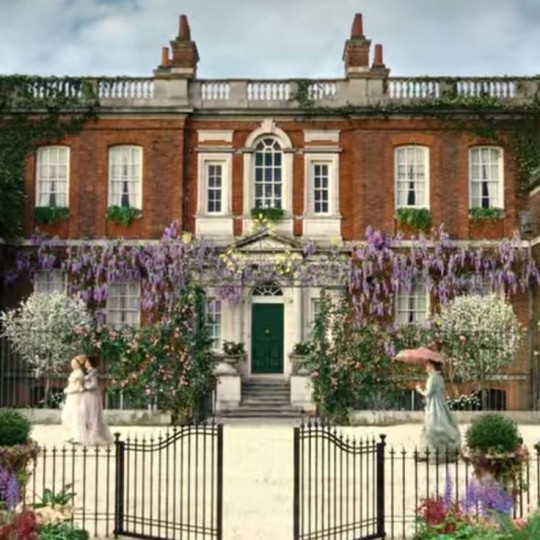
When we think of the Victorians, the grand old Gilded Age or the Edwardians, we all think of those big mansions and manors where some of our favourite stories take place. But what did a great house look like?
Layout
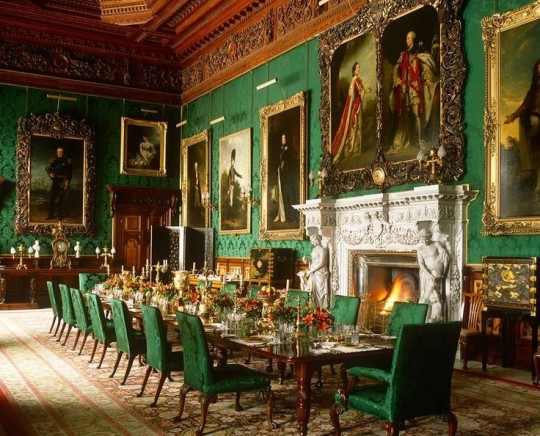
All great houses are different and some, being built in different eras, may adhere to different styles. But the layout of certain rooms usually stayed somewhat the same.
The highest floors including the attic were reserved the children's rooms/nursery and the servants quarters.
The next floor would be reserved for bedrooms. On the first/ground floor, there will be the dining room, drawing room, library etc.
The basement/cellar would be where the kitchens and other food related rooms would be. Servants halls and boot rooms may also be down here too along scullery, where sometimes a maid would clean.
Rooms used by Servants
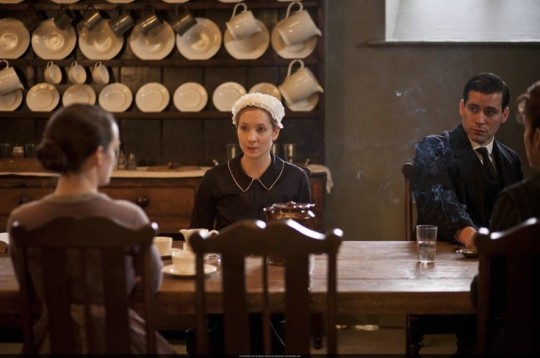
Boot Room: The Boot Room is where the valets, ladies maids, hallboys and sometimes footmen clean off shoes and certain items of clothing.
Kitchen: The Kitchen was usually either in the basement or the first floor of the house, connected to a garden where the house's vegetables were grown.
Butler's Pantry: A butler's pantry was where the serving items are stored. This is where the silver is cleaned, stored and counted. The butler would keep the wine log and other account books here. The butler and footmen would use this room.
Pantry: The Pantry would be connected to the kitchen. It is a room where the kitchens stock (food and beverages) would be kept.
Larder: The larder was cool area in the kitchen or a room connected to it where food is stored. Raw meat was often left here before cooking but pastry, milk, cooked meat, bread and butter can also be stored here.
Servants Hall: The Servant's Hall was where the staff ate their meals and spent their down time. They would write letters, take tea, sew and darn clothes. The servants Hall would usually have a fireplace, a large table for meals, be where the servant's cutlery and plates would be kept and where the bell board hung. (these bells were the way servants where summoned)
Wine Cellar: The wine cellar was where the wine was melt, usually in the basement. Only the butler would be permitted down there and everything would be catalogued by him too.
Butler's/Housekeeper's sitting rooms: In some houses, both the butler and the housekeeper had sitting rooms/offices downstairs. This was were they held meetings with staff, took their tea and dealt with accounts.
Scullery: The scullery was were the cleaning equipment was cleaned and stored. The scullery may even also double as a bedroom for the scullery maid.
Servery: The Servery connected to the dinning room. It was where the wine was left before the butler carried it out to be served. Some of the food would be delivered here to be carried out as well.
Servant's Sleeping Quarters: All servants excepting perhaps the kitchen maid and outside staff slept in the attics. Men and unmarried women would be kept at seperate sides of the house with the interconnecting doors locked and bolted every night by the butler and housekeeper. If the quarters were small, some servants may have to share rooms. Servants' bathrooms and washrooms would also be up there, supplied with hot water from the kitchens.
Rooms used by the Family
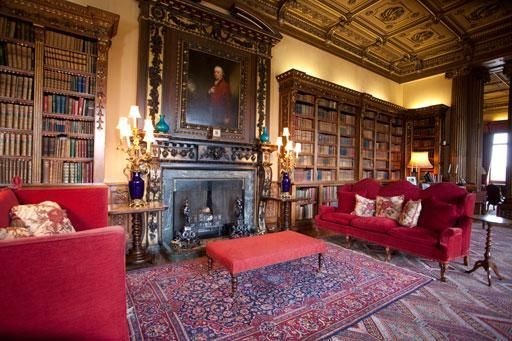
Dining room: The dining room was where the family ate their breakfast, lunch and dinner. It was also where the gentlemen took their after dinner drink before joking the ladies in the drawing room.
Drawing room: The Drawing Room was sort of a living/sitting room. It was mainly used in the evenings after dinner where the ladies would take their tea and coffee before being joined by the men. It could also be used for tea by the ladies during the day. The drawing room was seen as more of a women's room but any of the family could use it. The drawing room was a formal room but could also be used for more casual activities.
Library: The library is of course where the books are kept. The family would use this room for writing letters, reading, doing business with tenants and taking tea in the afternoons.
Bedrooms: The bedrooms would take up most of the upper floors. The unmarried women would sleep in one wing with bachelors at the furthest wing away. Married couples often had adjoining rooms with their own bedrooms in each and equipped with a boudoir or a sitting room.
Nursery: Was where the children slept, usually all together until old enough to move into bedrooms. They would be attended to be nannies and nursemaids round the clock.
Study: The study was a sort of home office where family could do paperwork, chill and write letters.
Dressing room: Dressing Rooms where usually attached to bedrooms where the family would be dressed and their clothes would be stored. The valets and ladies maids would have control of the room.
Hall: The hall was where large parties would gather for dancing or music or to be greeted before parties.
Furnishings and Decor

Most of these Great Houses were inherited which means, they came with a lot of other people's crap. Ornaments from anniversaries, paintings bought on holiday, furniture picked out by newly weds, all of it comes with the house. So most of the time everything seems rather cluttered.
As for Servant's Quarters, most of the furnishings may have been donated by the family as gifts. Most servants' halls would have a portrait of the sovereign or sometimes a religious figure to install a sense of morality into them.
#Fantasy Guide to A Great House#19th-20th Century#Anatomy of a great house#writeblr#writing reference#writing advice#writers on tumblr#writing advice writing reference#writing advice writing resources#writing resources writing advice#writing reference writing advice#Writing reference writing resources#Fantasy Guide#nobility#Servants#writing help
2K notes
·
View notes
Text





had to draw this scene from @jazzfordshire’s fic
#shadowzel#lae'zel#shadowheart#bg3#thank u fairymascot for overlay advice#great fanfic btw plz check it out#dusty art
658 notes
·
View notes
Text

#spiritual awakening#spiritual awareness#wisdom#great awakening#the great awakening#higher consciousness#good advice#guidance
376 notes
·
View notes
Text
nobody asked but the how to draw manga books that raised me cause i didnt have the blue one raise your hands up




#the akira toriyama and shojo ones were my favorites. genuinely awesome tips for me as a kid. the yosh one had great advice too for comics#also the keith sparrow one had killer guest art#DISCLAIMER I HAVENT READ ANY OF THESE IN APPROX 18 YEARS
320 notes
·
View notes
Note
any advice for those of us returning to school?

#again easier said than done but most teachers should be willing to help you if youre struggling#if not then Khan academy is great#maybe Risa would be better at romance if she used khan academy or got a tutor#loz#the legend of zelda#tloz#good advice ganondorf#ganondorf#good advice
412 notes
·
View notes
Text
I think one element modern-day Muppet productions are missing is explosions. if you don't have stuff just blowing up for literally no reason at least once per scene then really what are you doing

#muppets#the muppets#.gif#outdesign posts things#if I remember correctly the writers would just blow something up if a scene wasn't funny enough which is great writing advice all around#greatest hits
685 notes
·
View notes
Text
Stop putting bleach on your whites since whites are washed in hot water which neutralizes the bleach. Use peroxide instead, it helps lifts stains too
9 notes
·
View notes
Text



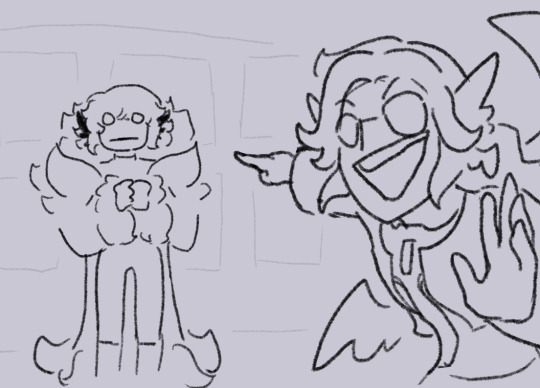

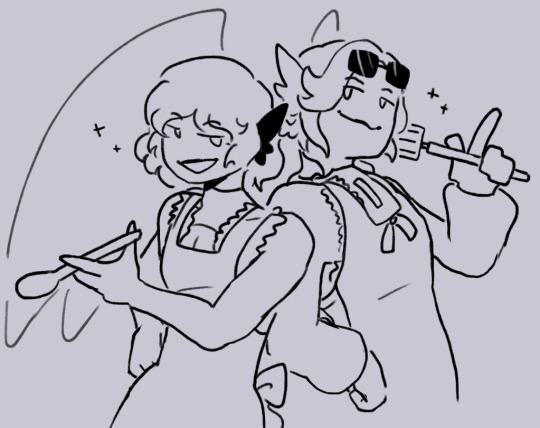
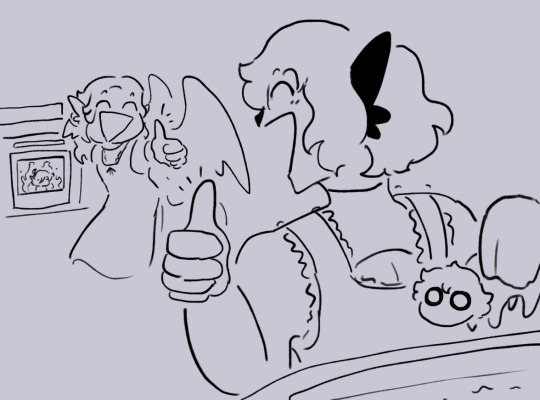
@sleepyeule and I talked about our sillies, our wet cats and babygirls,, there were so many doodle ideas i had and there are still more auuuu
nyx/lyner/mir belong to her, cassie/serif belong to me! 🫡
#my art#my oc#others ocs#silly doodles#ty for the convos and also great advice eule ;w;;; ur v cool#i look at sink lyner very often#someone help him OUGH#(hiraeth is super cool ty also for a lovely oc universe!!! :D)#verse versa
489 notes
·
View notes
Text
okay but can we PLEASE allow crowley to have emotions? can we let him be angry, upset, bitter, frustrated, and NOT immediately want to forgive aziraphale? can we let him be a complex being with complex emotions and trauma who is allowed to be heartbroken over aziraphale choosing heaven instead of him?
yes, they love each other. yes, they both hurt each other in that final argument. yes, neither of them is completely wrong or right.
for six thousand years, crowley has done *everything* to accommodate aziraphale. he has swallowed his emotions, crossed his own boundaries, tried again and again to get aziraphale to listen to him so he can finally make him understand how the fall changed him and how deeply fucked up the entire heaven/hell system is. it is why i cannot see the apology dance seen as "cute" or "romantic" because it's crowley once again ignoring his emotions to save aziraphale from heaven and himself; he did NOTHING wrong! aziraphale should be the one apologizing, not crowley.
and while yes, aziraphale has been on his own journey and is struggling with his own trauma, he needs to start putting crowley before his personal comfort. he needs to stop expecting crowley to throw his feelings in the wind and come crawling back to him with an apology on his lips.
the final argument was crowley saying he's DONE doing that. he's done meeting aziraphale on his side, either they'll meet in the middle or not at all - and rightfully so. aziraphale hasn't been listening to him this season, he never has.
do you really think if crowley had given him the details of the trial in heaven, gabriel's trial, anything at all that aziraphale would have believed him? no! he wouldn't have! his entire schtick is finding increasingly insane explanations for the shit heaven pulls so it doesn't contradict his personal view of it.
their relationship has never been healthy, unconditional love is NOT healthy or good. it's simply not. crowley is allowed to have hard boundaries and conditions, he's allowed to not forgive him immediately (or at all, although we all know he eventually will). aziraphale is ALSO allowed to be upset. i know that we all want them to be together and happy, but trauma recovery and personal growth aren't that simple. they're both more than the relationship they have with each other.
#alex talks good omens#good omens#ineffable husbands#crowley#aziraphale#good omens season 2#go2#aziracrow#crowley x aziraphale#ineffable divorce#i swear to god if i have to see one more “unconditional love is great and healthy and good” post i will punch the wall#and these are german brick walls they punch back#like jesus christ guys please this is psych 101 do i need to start sharing my therapist's advice on main or what
371 notes
·
View notes
Text
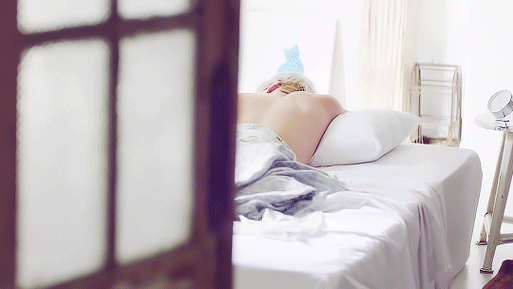



For jjong month ♡ part [1/4]
#jjongmonth#my little tribute to jjong month :) i love that everyone coming together to celebrate him this month! my heart is full <3#analook#tagging u because ur tags r the reason i knew about jjong month!! (new to shinee tumblr) and i thought u might want some jjong content :)#gifs sure are looking crispier~~ antlantis-area darling thank you!!!! <33 gif mentor advice coming in clutch! when i master this i will be#so powerfulllll i will ascend the stratosphere into space#the agit “the story by jonghyun” vcr#shinee#jonghyun#mygifs#speakofgifs#kim jonghyun#kpop#i also had the unfortunate discovery that gifs look great on the computer but pixelated on my phone. i think my phone screen must be#pretty shitty so sad lol :') i hope it looks good on other ppls phones at least heh~
162 notes
·
View notes
Text
Fantasy Guide to A Great House (19th-20th Century)

(I know, I've been slacking but I'm still alive)
When we think of the Victorians, the grand old Gilded Age or the Edwardians, we all think of those big mansions and manors where some of our favourite stories take place. But what and who did it take to run a great house?
Meet the Staff

Large numbers of staff were always needed to run great houses. Every department had its own management and its own teams, all working together to ensure everything ran smooth. There was both an interior and exterior team.
Interior
You can split the interior of the household into three departments: Service, Upkeep and Food Preparation.
Service
Butler: The Butler was the Head of all the household staff. He acted essentially as the manager of a great house, directing the staff on a day to day basis or at events on the command of the lord/lady/employer. Make staff would report mostly yo him and he would be in charge of keeping an eye on them. The Butler had charge of the wine cellars, the dining room, sometimes the pantry as well. As the manager of the house, Butlers were afforded the title of Mr. X. Our favourite examples being of course Mr Carson and Mr Pennyworth.
Valet: The valet was the male servant who handled the dressing of the men of the family. He would be in charge of his master's clothes, ensuring he was always dressed in the right outfit for the right activity (there was a lot) and be in charge of helping him into the outfit in question. The valet would also be in charge of cleanliness, sometimes shaving his master or running his bath. Valets were referred to as Surname and ranked in how their employer's ranked, for example the Lord’s valet would outrank his son's.
Lady's Maid: The lady's maid was similar to the valet. She was in charge of keeping the ladies of the house looking their best and handling their needs. She would style hair, care for jewels, mend clothes, care for clothes and often act as a companion, accompanying her lady on visits or day's out. The lady's maid was referred to by their surname.
Footman: The footman was a male servant who served at table, fetched items, handled heavy lifting such as luggage, opened and closed doors. Most footmen were young men and en chosen for good looks. Footmen polished the silver services at great houses and when called upon would often take on the role of valet to guests without a servant to help. Footmen were referred to as their firstname. Footmen were denoted by rank, the highest being first footman who had charge over the others and would assist the butler in some tasks.
Upkeep
Housekeeper:The housekeeper was second in command but she ran her most of the interior staff, especially those who took care of the house itself. She supervised all female staff. She helped the lady of the house when it came to running events and caring for guests. The housekeeper is always Mrs. Surname even when she's unmarried.
Housemaid: Housemaids clean the house. They would dust, make and strip beds, straighten things up and keep the house looking it's best. The housemaid was a servant that was almost never seen, usually rising early, lighting the fires, cleaning the house as the family moves from room to room. She was called by her Firstname.
Scullery Maid: The scullery maid is the lower ranking maid. She would also have been younger and less experienced. She was in charge of the more unsightly work: laying the fires, scrubbing the floors, emptying chamberpots, cleaning servant's chambers. She may even do mending and washing for other servants. She was called by her first name.
Hall boy: The hall boy was also young and handled the worst jobs. He would polish boots belonging to the family and sometimes staff, cempty the servant's chamberpots and waited on on the higher ranking servants. He was called by his name.
Food Preparation
Cook: The cook or chef was the third highest ranking servant downstairs and they ran their own department. They were in charge of the kitchen staff. All cooks and chefs would meet almost daily with the lady of the house to discuss menus and ordering but would answer to both housekeeper and butler. As with the housekeeper, a female cook or chef is Mrs Surname despite martial status and make cooks/chef are Mr.
Kitchen maid: The kitchen maid helped the cook/chef in preparing the food. She would be one of the first servants up, in charge of lighting the ovens and starting the breakfast for the family and servants. She would clean the kitchen, boil water when needed and bring food up to the servery when needed. She would be called by her first name.
Exterior
The house would needed a team on the outside to handle the stables, the gardens and any outdoor activity.
Gardeners: They would be responsible for the upkeep of the grounds itself, caring for the gardens. There would be multiple at a great house led by a head gardener.
Stableboy/groom/kennelmaster: They would take care of the family's horses and dogs. They would take care of tack, help plan hunts and riding pursuits and handle carriages.
Chauffeur: As automobiles became popular in this period, a chauffeur was needed to drive the family and take car of their motor.
Lives of Servants
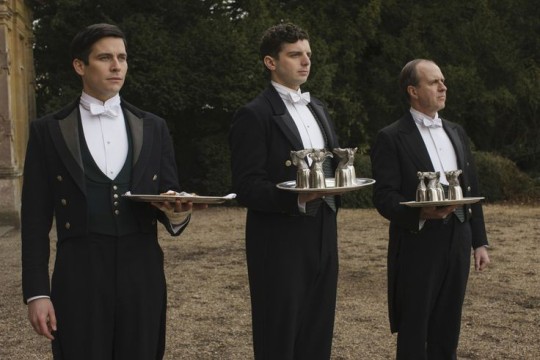
Servants were paid very little at this time, mainly because most staff got free room and board. Most of the interior staff would live in the house itself and be supplied meals. Chauffeurs, gardeners etc would live nearby on the estate either as locals or be supplied a house as a staff member. Staff uniforms were also supplied. Days off were rare but not withheld. Permission was needed to leave the house either to visit the shop or take a few days off.
Servants were expected to be obedient, modest and humble at all times. They were expected to stand in the presence of their master's, speak only when spoken to and never question an order. They had to be ready for anything at the drop of a hat. You've set for a dozen guests but now there's five more coming? Tough luck, change the table settings. You get seasick? Nevermind that, your gentleman is going across the sea and as his valet you're going with him, like it or not.
Servants from one house often travelled to with the family to their other residences: the butler, footmen, chef, kitchen maids, lady's maid, valet would all go with the family while everybody else would get left behind. Every house would have its own housekeeper if it could be afforded. Housemaids and other staff needed could be hired locally when needed.
The Daily Routine
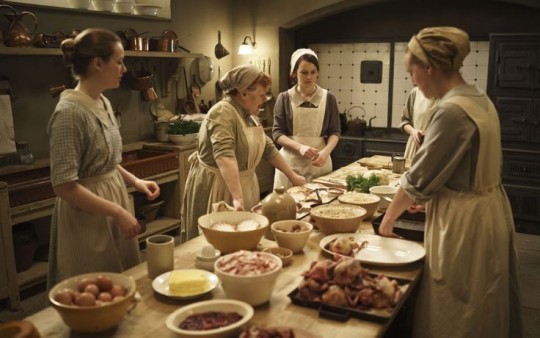
The working day of a servant in a grand house was a long arduous one.
Morning: At 6am, the servants rise. The scullery maid gets up and begins lighting the fires, starting with the kitchen. Then she cleans the kitchen top to bottom before the staff get in to cook. The kitchen maid would rise at the same time, helping with the cleaning. She would set for the servant's breakfast and start cooking it. The footmen open the shutters upstairs, cleans whatever tools they will need such as glasses and silverware, tend the lamps and sets for breakfast upstairs. The housemaids go about the house cleaning up after the night before, starting in the rooms that aren't being used (any room that's not the bedrooms). At around 8, the cook rises and starts the day. The kitchen maid serves breakfast to the other servants before returning to the kitchen to eat her own breakfast with the other kitchen staff. After breakfast, the housemaid will change her apron and deliver hot water to each of the bedrooms for the family. At 9, the family rise. Married women have breakfast in bed with all other family members and visitors eating in the dining room. Valets and lady's maids would have dressed them prior, gathering up any clothes to be mended or washed. The footmen and butlers will serve while the housemaids go into each empty room and begin their chores.
Midday: Just before midday, the chef would speak with the lady of the house to discuss menus. At around 11, the staff were permitted their first break, just enough time for a drink usually a cup of tea before they started again. The chef would start preparing for the main dinner of the evening with the lady's approval. Footmen would take their places at entrances or attend the family where he may be needed. At noon, the servants would have their dinner. At 1, the family would sit for their lunch. Once lunch is over, a footman might be permitted to attend personal business (with permission from the butler first) or be sent on errands out of the house such as delivering messages. While the family sit for breakfast, the maids tidy up any room they have been using since getting up.
Afternoon: The family take tea around 4. The footmen clear the tea before heading down to take their tea - a light meal- with the other servants around 5. Afterwards, the footmen will start to light the lamps, close the shutters and draw the curtains. The butler would oversee the laying of the table for dinner with the footmen. The first footman carries the silver, the second the china, while the butler sets the silver and glasses. If a guest is coming, a footman will remain on the door to see them in.
Evening: At 8, the footman or butler signals the start of supper. This is done by the rinibg of the gong or bell which gives the family and any staying guests, 15mins or more to get ready. Valets and lady's maids would already be upstairs at this point, helping their master/mistress. When the family head downstairs, they linger in the drawing room to chat while a footmen keeps an eye on them. Any guests visiting for dinner would be let in by a footman and announced upon entry. The butler announces dinner and escorts the family in. The footman serve the food while the butler pours the wine (chosen by the Lord with the butler's help). The footman stay in the dining room all throughout dinner, excepting when they go to the servery to collect the food from the kitchen maid. They serve and clear the plates for every course. When dinner is over, a footman will stay with the men while they drink their port while another serves the ladies their coffee in the drawing room. While dinner is on, the housemaid would tidy the empty rooms, check the fires and turn down the beds. At 9, the servants eat their supper while the family chill. When supper is over and the family is done for the night, the valets and lady's maids would ready their masters for bed. A footman would wait in the hall with candlesticks for the family and show any departing guest out. The kitchen staff would start to clean up while the butler starts locking up the house. The staff would get to bed about 11:30 - 12.
#Fantasy Guide to A Great House#Guide to A Great House part 1#Staff#Employment#Historical reference#Writing reference#writeblr#Writing help#Writers guide#Writing research#writers resources#writing resources writing advice#Writing advice#19th century#20th century#Edwardian#Gilded age#Victorian era
2K notes
·
View notes